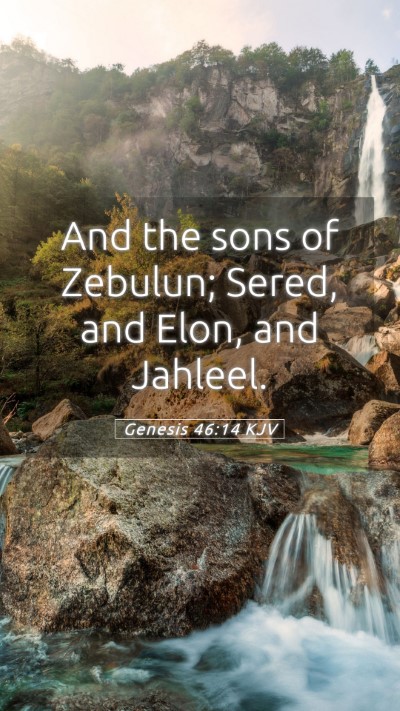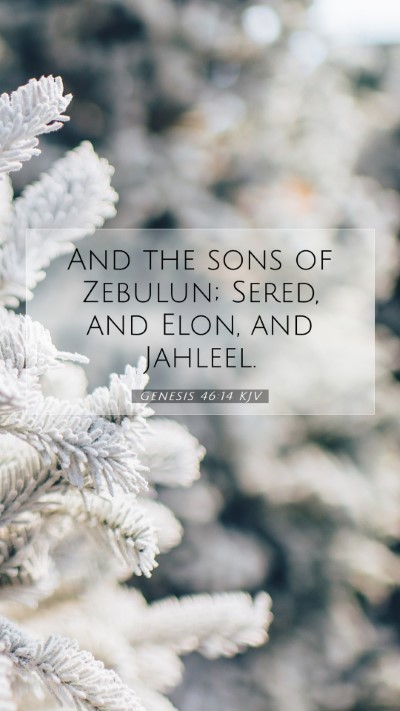Understanding Genesis 46:14 - A Comprehensive Bible Verse Commentary
Genesis 46:14 reads as follows: "And the sons of Zebulun; Sered, and Elon, and Jahleel." This passage, while seemingly straightforward, carries significant weight in the context of biblical narratives and the broader story of the Israelites. To derive a deeper understanding, we can draw insights from renowned public domain commentaries, including those by Matthew Henry, Albert Barnes, and Adam Clarke.
Overview of Genesis 46:14
This verse introduces the sons of Zebulun, one of the twelve tribes of Israel, and marks the continuation of the genealogy that is so prevalent in the Book of Genesis. The genealogical listings serve multiple purposes, including establishing heritage, identifying tribal lineage, and highlighting God's covenant promises to His people.
Commentary Insights
-
Matthew Henry's Commentary:
Matthew Henry emphasizes the importance of each name, suggesting that even these seemingly simple listings carry weight in God's design. He points out that the names of Zebulun's sons can be reflective of the different characteristics and roles of the tribes of Israel. Furthermore, he notes that these family connections are significant in understanding the fulfillment of God's promises and the establishment of the nation of Israel.
-
Albert Barnes' Commentary:
Albert Barnes provides insights into the historical context surrounding the sons of Zebulun. He outlines that Zebulun's lineage plays a crucial role in the narrative of Israel's settlement in Canaan. The tribe of Zebulun is often associated with maritime activities, enhancing the understanding of their cultural and economic contributions to the Israelite heritage.
-
Adam Clarke's Commentary:
Adam Clarke delves deeper into the genealogical importance of Zebulun's sons, suggesting that these names encapsulate the essence of the tribe's identity. Clarke often connects the listing to the larger themes of God's faithfulness in preserving and multiplying the descendants of Israel, showcasing the continuous unfolding of God's divine plan through generations.
Significance of Names in Genesis 46:14
The names Sered, Elon, and Jahleel have meanings that could provide further insights into the characteristics or destinies of Zebulun's descendants. Understanding the etymology of these names can facilitate a richer interpretation of this verse and their implications for the tribe of Zebulun.
Name Analysis
-
Sered:
This name may imply a connection to being surrounded or protected, offering insights into the tribe's mindset or role in the larger society.
-
Elon:
Often translated as "oak," it signifies strength and stability, suggesting that this line may have contributed to the enduring nature of the tribe.
-
Jahleel:
Meaning "God is exalted," this name signifies the spiritual connection of Zebulun’s descendants to divine favor and the broader narrative of Israel's reliance on God's providence.
Connecting Genesis 46:14 to Broader Biblical Themes
The importance of family lineage and their implications extend beyond Genesis into the New Testament, where the genealogies of Jesus reflect the fulfillment of Old Testament prophecies and covenants. Thus, the names listed here are not just a record of individuals; they represent the continuation of God's promises to Abraham, Isaac, and Jacob.
Cross-References
- Genesis 49:13: Zebulun’s blessing by Jacob, which foretells the tribe's future.
- Numbers 1:20-31: The tribal enumeration during the exodus from Egypt.
- Joshua 19:10-16: The allocation of land to the tribe of Zebulun.
Conclusion
In summary, Genesis 46:14 serves as a cornerstone for understanding the genealogical progression of the Israelites. Through the insights provided by esteemed commentaries, we see that the names hold deeper meanings that contribute to the identity and destiny of the tribes of Israel. Each verse in the Scripture, including this one, deserves careful exegesis and reflection as we seek to understand the rich history and theology of the Bible.
As you explore Bible study insights and seek resources, remember that understanding Scripture requires both historical knowledge and spiritual interpretation. Each name, each verse, and each chapter contributes to the grand narrative of faith and understanding the meaning of Bible verses leads us closer to God’s heart.


